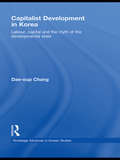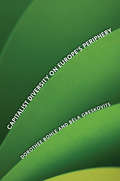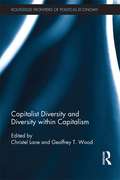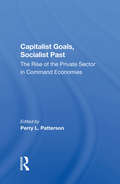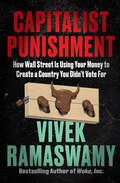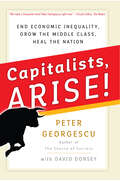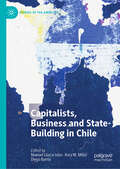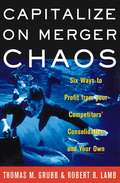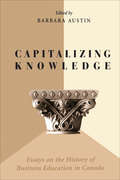- Table View
- List View
Capitalist Development in Korea: Labour, Capital and the Myth of the Developmental State (Routledge Advances in Korean Studies)
by Dae-oup ChangContrary to the widely-held view that the East Asian "developmental state" is neutral in terms of the relationship between capital and labour – a benign co-operation between state officials and businessmen to organise economic development – this book argues that in fact the developmental state exists to promote the interests of capital over the interests of labour. Dae-oup Chang asserts that there has been a deliberate mystification concerning the reality of this process. This book presents a radical, Marxist critique of state development theory. It both explains the exploitative functions of the state, looking at the emergence of the particular form of capitalist state in the context of the formation and reproduction of capital relations in Korea; and also traces the origin and development of the process of mystification whereby the capitalist state has been characterised as the autonomous developmental state. In addition, the book provides a comprehensive analysis of labour relations in Korea both before and after the 1998 financial crisis, demonstrating continuing capital relations, state transition and class struggle.
Capitalist Discipline
by Arthur WassenbergThis book is not just about corporate strategies and stratagems: it is about the 'Faustian' pact between real and financial powers, governed by the rules of 'minimizing the costs to oneself of imposing losses upon others'. It is more than about limited rationality and irrationality: it is about unlimited rationalisations and limited accountability.
Capitalist Diversity On Europe's Periphery
by Dorothee Bohle Béla GreskovitsWith the collapse of the Council for Mutual Economic Assistance in 1991, the Eastern European nations of the former socialist bloc had to figure out their newly capitalist future. Capitalism, they found, was not a single set of political-economic relations. Rather, they each had to decide what sort of capitalist nation to become. In Capitalist Diversity on Europe's Periphery, Dorothee Bohle and Béla Geskovits trace the form that capitalism took in each country, the assets and liabilities left behind by socialism, the transformational strategies embraced by political and technocratic elites, and the influence of transnational actors and institutions. They also evaluate the impact of three regional shocks: the recession of the early 1990s, the rolling global financial crisis that started in July 1997, and the political shocks that attended EU enlargement in 2004. Bohle and Greskovits show that the postsocialist states have established three basic variants of capitalist political economy: neoliberal, embedded neoliberal, and neocorporatist. The Baltic states followed a neoliberal prescription: low controls on capital, open markets, reduced provisions for social welfare. The larger states of central and eastern Europe (Poland, Hungary, and the Czech and Slovak republics) have used foreign investment to stimulate export industries but retained social welfare regimes and substantial government power to enforce industrial policy. Slovenia has proved to be an outlier, successfully mixing competitive industries and neocorporatist social inclusion. Bohle and Greskovits also describe the political contention over such arrangements in Romania, Bulgaria, and Croatia. A highly original and theoretically sophisticated typology of capitalism in postsocialist Europe, this book is unique in the breadth and depth of its conceptually coherent and empirically rich comparative analysis.
Capitalist Diversity and Diversity within Capitalism (Routledge Frontiers Of Political Economy Ser. #151)
by Christel LaneThe economic crisis that began in 2008 has underscored the impact not only of embedded and assumed ways of managing the economy, but also that present circumstances are the product of a long period of experimentation and bounded diversity; it is understanding the nature of both that forms a central concern of this collection. This book redefines, develops and extends the emerging literature on internal diversity within varieties of capitalism, and the extent to which such internal systemic diversity goes beyond mere diffuseness to represent the coexistence of different logics of action within both liberal market and more cooperative varieties of capitalism. The collection is based on new, fresh material, from leading scholars in the field. The contributors come from a variety of perspectives within the broad socio-economic literature on institutions, and yet they all focus on the limitations of current institutional fixes, and the protracted and durable nature of the current crisis, which, the editors suggest, reflect profound changes in input costs and the utilization of technology. What characterizes this common ground is an inherent pragmatism, combined with an increasing sophistication in the usage of analytical concepts; illustrating the progression since the early work on comparative capitalism in the late 1990s and early 2000s. This book should be an invaluable resource for students and researchers of economic theory and philosophy as well as political economics and socio-economics.
Capitalist Enterprise and Social Progress
by Maurice DobbPart 1 of this volume analyses the main issues in the theory of Applied Economics. Part 2 surveys the rise of capitalist enterprise and indicates the importance of certain institutions in the growth and working of the economic system at the start of the twentieth century. The concluding chapters stress the relevance of these considerations to the problems facing politicians and administrators.
Capitalist Family Values: Gender, Work, and Corporate Culture at Boeing
by Polly Reed MyersThough best known for aircraft and aerospace technology, Boeing has invested significant time and money in the construction and promotion of its corporate culture. Boeing’s leaders, in keeping with the standard of traditional American social norms, began to promote a workplace culture of a white, heterosexual family model in the 1930s in an attempt to provide a sense of stability for their labor force during a series of enormous political, social, and economic disruptions. For both managers and workers, the construction of a masculine culture solved problems that technological innovation and profit could not. For managers it offered a way to govern employees and check the power of unions. For male employees, it offered a sense of stability that higher wages and the uncertainties of the airline market could not. For scholar Polly Reed Myers, Boeing’s corporate culture offers a case study for understanding how labor and the workplace have evolved over the course of the twentieth century and into the present day amid the rise of neoliberal capitalism, globalization, and women’s rights. Capitalist Family Values places the stories of Boeing’s women at the center of the company’s history, illuminating the policy shifts and economic changes, global events and modern controversies that have defined policy and workplace culture at Boeing. Using archival documents that include company newspapers, interviews, and historic court cases, Capitalist Family Values illustrates the changing concepts of corporate culture and the rhetoric of a “workplace family” in connection with economic, political, and social changes, providing insight into the operations of one of America’s most powerful and influential firms.
Capitalist Goals, Socialist Past: The Rise Of The Private Sector In Command Economies
by Ben Slay Perry L PattersonAn examination of the rise of the private sector in command economies.
Capitalist Imperialism, Crisis and the State (Fundamentals Of Pure And Applied Economics Ser. #Vol. 7)
by J. WilloughbyHow valid is the Marxian theory of imperialism? This book traces the historical development of the theory of imperialism, the internationalisation of capital and theories of capitalist nation-state formation
Capitalist Outsiders: Oil's Legacy In Mexico And Venezuela (Pitt Latin American Ser.)
by Leslie C. GatesSocial polarization has roiled neoliberal political establishments but has rarely culminated in electoral victories for anticapitalist outsiders. Instead, outsiders who accommodate capitalists often prevail. Capitalist Outsiders revisits celebrated exemplars of Latin American populism in Mexico and Venezuela to shed light on this phenomenon. It reveals how anticorruption campaigns boosted Mexico’s neoliberal-era capitalist outsider by drowning out salacious corporate scandals; how Venezuela’s apparently enlightened capitalist outsiders of the 1940s relied on segregationist, punitive labor relations; and how corporate insiders of Venezuela’s neoliberal political establishment unwittingly validated the anticapitalist Hugo Chávez as the true outsider. It weaves together these case studies to reveal an unlikely common origin for capitalist outsiders in both countries: their sequential insertion into global oil production and Mexico’s early twentieth-century radical oil workers. Capitalist Outsiders moves beyond cataloging “populist” traits and tactics or devising the institutions that might avert their rise. Instead, it specifies the distinct social bases of capitalist vs. anticapitalist outsiders. It exposes how a nation’s earlier incorporation into the capitalist world economy casts a long shadow over neoliberal-era outsider politics.
Capitalist Political Economy: Thinkers and Theories
by Heather WhitesideA key text, Capitalist Political Economy: Thinkers and Theories analyses the field-forming theoretical contributions to political economy that have defined, debated, critiqued, and defended capitalism for more than three centuries. Political economy recognizes and celebrates the many and varied interconnections between politics and economics in society, together with the economic implications of public policy and the political impact of market and property relations. As such, political economy is both an approach to understanding capitalism and a reflection of the forms and features of capitalism at particular moments. Grounded in primary and secondary literature including theorists’ original writings and leading literary biographies, this text explores principal themes in the development of capitalism and political economic thought. It relates these to markets, property, profits, labour, investment, innovation, the state, growth and crises, gender, the ecological limits of capital accumulation, and rival economic practices. The book contextualizes the legacy of foundational political economists by exploring their life and times and putting them in conversation with other highly influential theorists. Equally, it also considers more contemporary views. This book serves as an indispensable source for academic communities who are interested in the long arc of capitalist development, theories, and theorists.
Capitalist Punishment: How Wall Street Is Using Your Money to Create a Country You Didn't Vote For
by Vivek RamaswamyA Wall Street cartel has quietly seized control of the American economy, and they are forcing governments and businesses to bow down to their political agenda—using your money to do it.Three Wall Street firms have quietly amassed more money than Jeff Bezos, Elon Musk, Andrew Carnegie, and John Rockefeller combined. But the money isn’t even theirs. These asset managers have accumulated all their power through “passive funds,” as most investors no longer believe anyone can reliably pick stocks. Yet the Big Three have decided that they can reliably pick the right social policies instead.As entrepreneur Vivek Ramaswamy reveals, the results are all bad—and working their way into every corner of the economy. They force US companies to adopt “racial equity audits” and “emissions caps” while supporting human rights atrocities in China. They coerce Western companies to produce less oil while shifting production to dirtier places like Russia. They allow companies like FTX to take victory laps on good management while collapsing like a house of cards. They charge high fees to mom-and-pop investors for so-called sustainable funds that are effectively identical to lower-fee index funds.Worst of all, they’re celebrated as heroes—at least so far. Capitalist Punishment lifts the veil on the largest fiduciary breaches, antitrust abuses, and First Amendment violations of the twenty-first century, misdeeds that are hiding in plain sight. This isn’t just a threat to capitalism. It’s a threat to democratic self-governance itself. Capitalist Punishment is an easy-to-follow educational tour de force for every participant in financial markets—which, to the surprise of most Americans, includes nearly every single one of them.
Capitalist Restructuring, Globalization and the Third Way: Lessons from the Swedish Model (RIPE Series in Global Political Economy)
by J. Magnus RynerThis book addresses the contemporary debate about the 'third way' in European social democracy, by analysing the exemplar case of social democracy - 'the Swedish model' - this book challenges the recent 'third way' perspective. The author argues strongly against the widely held belief that the nature of contemporary capitalist restructuring and globalisation has rendered traditional social democracy obsolete.
Capitalist Solutions: A Philosophy of American Moral Dilemmas
by Andrew BernsteinThe US is facing enormous challenges as it enters the second decade of the twenty-first century. Some of these major issues are environmentalism and its claim of global warming; the danger from terrorism generated by Islamic fundamentalism; and affordable, quality health care. Additionally, education in America remains an unresolved dilemma contributing to America's lack of economic competitiveness. Andrew Bernstein argues that the US government is pushing the nation toward socialism in its attempt to resolve America's problems. The government's increasing control of the banking industry, its massive bailouts of auto makers, and its proposal of emissions legislation are also examples of the expansion of government's power. Bernstein argues that whatever the intentions of the government, or its illusions about the workability of its proposals, morally upright and practical solutions can only come from moving to the opposite end of the political-economic spectrum: the establishment of laissez-faire capitalism. In Atlas Shrugged, and in her non-fiction works, Ayn Rand developed a systematic body of thought, a comprehensive philosophy she dubbed "Objectivism." This philosophy has been neglected by most professional intellectuals, but it is now beginning to be seriously studied in academic philosophy departments. Objectivism provides the moral and philosophic validation of the political-economic principles of individual rights and free markets. Analysis of today's gravest social and political issues within this philosophic framework, as undertaken by Bernstein in this volume, constitutes a unique way of identifying rational solutions to these pressing issues.
Capitalist Workingman's Paradises Revisited: Corporate Welfare Work in Great Britain, the USA, Germany and France in the Golden Age of Capitalism, 1880-1930
by Erik GierThis book offers an in-depth exploration of the international phenomenon of enlightened paternalist capitalism and social engineering in the golden age of capitalism in the United States, United Kingdom, Germany, and France. Erik de Gier shows how utopian socialist, religious, and craft-based ideas influenced the welfare work and educations programmes offered by paternalistic businesses in different ways from nation to nation, looking closely at sites like the Pullman community in Chicago and Port Sunlight in the UK. De Gier brings the book fully up to date with a brief comparison to contemporary welfare capitalism in our highly flexible working world.
Capitalists Against Markets: The Making Of Labor Markets And Welfare States In The United States And Sweden
by Peter A. SwensonConventional wisdom argues that welfare state builders in the US and Sweden in the 1930s took their cues from labor and labor movements. Swenson makes the startling argument that pragmatic social reformers looked for support not only from below but also from above, taking into account capitalist interests and preferences. Juxtaposing two widely recognized extremes of welfare, the US and Sweden, Swenson shows that employer interests played a role in welfare state development in both countries.
Capitalists in Communist China
by Keming YangAfter the Communist Party came to power in 1949, capitalists disappeared from China's political and economic landscape. As the government launched economic reforms, however, a new generation of capitalists emerged as an economic and social group of considerable influence. Keming Yang examines some crucial aspects of this group's political life: their self image, and their political image; associations; treatment of their employees; relationships with government officials. Exploring the implications of China's political development, Yang considers the notion of 'elite corporatism', and why democracy remains so distant in China's political system.
Capitalists, Arise!: End Economic Inequality, Grow the Middle Class, Heal the Nation
by Peter GeorgescuPeter Georgescu arrived in this country as a penniless Romanian refugee and rose to become the CEO of Young & Rubicam. This is why he's so heartsick that with flat wages, disappearing jobs, and a shrinking middle class, his kind of rags-to-riches story doesn't seem possible now. But he has a message for his fellow CEOs: we're the ones who must take the lead in fixing the economy.Marshaling deeply sobering statistics, Georgescu depicts the stark reality of America today: a nation with greater wealth inequality and lower social mobility than just about any other country in the developed world. But the problem isn't that free-market capitalism no longer works—it's that it's been hijacked by shareholder primacy. Where once our business leaders looked to the needs and interests of a variety of stakeholders—employees, community members, the business itself—now they're myopically focused on maximizing their shareholders' quarterly returns. Capitalists, Arise! shows how the short-term thinking spawned by shareholder primacy lies at the root of our current economic malaise and social breakdown. But Georgescu offers concrete actions that capitalists themselves can take to create a better future. The irony is that if businesses do this, shareholders will do even better. In the long run, businesses can thrive only when society is healthy and strong. This book is a manifesto calling on capitalists to heal the nation that has given them so much.
Capitalists, Business and State-Building in Chile (Studies of the Americas)
by Manuel Llorca-Jaña Rory M. Miller Diego BarríaThroughout the twentieth century, the Chilean business elite has played a central role in the country, not just as entrepreneurs but also as political and social actors. The chapters in this book, the first in English on the history of Chilean business, focus on the importance of diversified family business groups in twentieth-century Chile, their dynamics, organisation, and management, and their interaction with foreign investors and the state. Using a range of company and government archives, as well as other contemporary sources in Chile, Britain, and the United States, the individual authors pay particular attention to many key topics: the evolution of the Edwards family businesses, those of Pascual Baburizza, Chilean corporate networks, British firms in the nitrate industry, the Anglo South American Bank, the Copec group, Compañía Explotadora de Tierra del Fuego, the energy sector, SOFOFA (the industrialists’ association), and the recent growth of Chilean multinationals.
Capitalize on Merger Chaos
by Robert B Lamb Thomas M GrubbMerger mania is at an all-time peak. Yet up to 80 percent of mergers fail because of culture clashes, mismanagement, and the chaos that ensues. Taking this failure rate into account, merger experts Thomas M. Grubb and Robert B. Lamb have written the first book that arms managers with strategies to exploit the many growth and profit opportunities created when competitors are coping with merger chaos. Grubb and Lamb show why firms miss huge financial opportunities when they stay passive while their competitors struggle in merger chaos. They present a fast-paced primer for action when your corporate rivals merge, based on six strategies: Attack your competitors when they are distracted by their mergers' turmoil and confusion. Create a "magnet strategy" to attract and hire your merging competitors' best people while their companies are in a state of merger shock. Use the threat to your firm's survival caused by giant competitors' mergers in order to jump-start your own internal change. Use multiple alliances, networks, licensing, franchising, or joint ventures -- instead of mergers -- to fuel explosive growth. Plan and execute your firm's fast-track mergers and acquisitions. Create a composite strategy by using two or more of the above strategies simultaneously to maximize your growth and profitability. The authors analyze winning strategies at AOL, General Electric, Dell, Ford, Cisco Systems, and Vodaphone as well as failures at Coca Cola, Boeing, Union Pacific, Compaq, and Sunbeam. The result is "must" reading for operating managers at all levels, investment bankers, and mergers and acquisition specialists.
Capitalizing China
by Joseph P. H. Fan Randall MorckChinaOCOs economic boom over the last two decades has taken many analysts by surprise, given the ongoing role of central government planning. Its current growth trajectory suggests that the size of its economy could soon surpass that of the United States. Some argue that continued growth and the expanding middle class will ultimately exert pressure on the government to bring about greater openness of the financial market. aTo better understand ChinaOCOs recent economic performance, this volume examines the distinctive system it has developed: OC market socialism with Chinese characteristics. OCO While its formal institutional makeup resembles that of a free-market economy, many of its practices remain socialist, including strategically placed state-owned enterprises that wield influence both directly and through controlled business groups, and Communist Party cells whose purpose is to maintain control of many segments of the economy. ChinaOCOs economic system, the contributors find, also retains many historical characteristics that play a central role in managing the economy. These and other issues are examined in chapters on ChinaOCOs financial regulations, corporate governance codes, bankruptcy laws, taxation, and disclosure rules.
Capitalizing Development Costs at Fiat Chrysler Automobiles and Volkswagen
by Paul M. Healy Marshal HerrmannCase
Capitalizing Knowledge: Essays on the History of Business Education in Canada
by Barbara AustinInterpreting the path of the future is made easier by understanding the past. In light of this adage, Capitalizing Knowledge examines the history of Canadian business faculties in their search for professional legitimacy. As the title suggests, this volume is an overview of the development of business schools in Canadian universities. Business faculties have different characteristics; some are noted for generating management research, while others generate interaction with the business community. Some programs are famous for their MBA graduates, others for their undergraduate students. This collection of essays describes the critical events that have defined the character of these faculties and societies of business education in Canada over the course of the twentieth century. Eight universities are profiled, including Queen's, York, and the University of Toronto. In addition, the development of the Administrative Sciences Association of Canada (ASAC) is traced.The first book of its kind, Capitalizing Knowledge contains original research by some of the leading Canadian business school academics, who describe how these programs have evolved. The contributors all note the particular importance of organization culture and values in moulding the actions of faculty members. They also highlight the difficulties associated with establishing a body of knowledge in business management and transforming that knowledge to suit ever-changing business organizations and industry at large.
Capitalizing On Crisis: The Political Origins Of The Rise Of Finance
by Greta R. KrippnerIn the context of the recent financial crisis, the extent to which the U. S. economy has become dependent on financial activities has been made abundantly clear. In Capitalizing on Crisis, Greta Krippner traces the longer-term historical evolution that made the rise of finance possible, arguing that this development rested on a broader transformation of the U. S. economy than is suggested by the current preoccupation with financial speculation. Krippner argues that state policies that created conditions conducive to financialization allowed the state to avoid a series of economic, social, and political dilemmas that confronted policymakers as postwar prosperity stalled beginning in the late 1960s and 1970s. In this regard, the financialization of the economy was not a deliberate outcome sought by policymakers, but rather an inadvertent result of the stateâe(tm)s attempts to solve other problems. The book focuses on deregulation of financial markets during the 1970s and 1980s, encouragement of foreign capital into the U. S. economy in the context of large fiscal imbalances in the early 1980s, and changes in monetary policy following the shift to high interest rates in 1979. Exhaustively researched, the book brings extensive new empirical evidence to bear on debates regarding recent developments in financial markets and the broader turn to the market that has characterized U. S. society over the last several decades.
Capitalizing Your Technology to Disrupt and Dominate Your Markets: Transforming Cost Centers to Innovation Centers
by Aviv Ben-YosefEvery business today has some technology as part of its strategy. Inevitably, it is becoming harder for many CEOs to effectively lead their R&D efforts at the same time that their investment in tech keeps growing. Even startup founders can find themselves flustered when trying to understand whether a particular issue is genuinely impossible to solve, getting the team to provide reliable estimates, and having their top tech leaders speak in plain words as opposed to jargon. This book helps them bridge the culture gap between the C-suite and R&D, covers frequent tech-related decisions and issues, and provides a way to unlock tech as an offensive weapon and a strategic differentiator. To create an environment where technology is not merely an execution mechanism but acts as a fulcrum for strategic opportunities, one must put a particular leadership team in place and equip them with digital literacy. Based on the author’s experience and discussions with hundreds of executives worldwide, he short-circuits common failure patterns and enables nontechnical senior leaders to act with more certainty and clarity regarding their tech efforts. Startups and tech efforts initiated without enough understanding of the technical aspects often have to be scrapped and started from scratch within 18 months. This can make or break certain endeavors, and as the author has helped his clients avoid these problems, the book will help the readers establish a sturdy foundation to work from. This book covers clear guidelines for founders, executives, and senior leaders that are not tech-savvy. These include establishing a tech organization, making the first key hires, assessing the relevance and risk involved in different options, and creating a healthy connection as opposed to a tech silo. On top of that, it will include lessons and case studies that stem from experience in the "Startup Nation," such as how to inject chutzpah into daily discussions and create an organization with habitual innovation.
Capitalizing a Cure: How Finance Controls the Price and Value of Medicines
by Victor RoyA free open access ebook is available upon publication. Learn more at www.luminosoa.org.Capitalizing a Cure takes readers into the struggle over a medical breakthrough to investigate the power of finance over business, biomedicine, and public health. When curative treatments for hepatitis C launched in 2013, sticker shock over their prices intensified the global debate over access to new medicines. Weaving historical research with insights from political economy and science and technology studies, Victor Roy demystifies an oft-missed dynamic in this debate: the reach of financialized capitalism into how medicines are made, priced, and valued. Roy’s account moves between public and private labs, Wall Street and corporate board rooms, and public health meetings and health centers to trace the ways in which curative medicines became financial assets dominated by strategies of speculation and extraction at the expense of access and care. Provocative and sobering, this book illuminates the harmful impact of allowing financial markets to determine who heals and who suffers and points to the necessary work of building more equitable futures.
